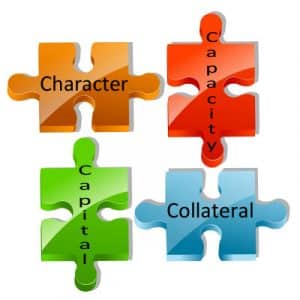If you want to apply for a loan, say a mortgage on a home, there are some things you need to know. When making lending decisions, lenders consider some factors that help them evaluate the character of the borrower. These elements determine the borrower’s creditworthiness, and they can be termed the 4 Cs of credit. The 4 Cs of credit include character, collateral, capital, and capacity. Knowing these 4 Cs and how they work will help you to make good decisions when buying a home.
Elements of Credit
Apart from your credit score, lending institutions lay emphasis on four basic elements. These are known as elements of credit and they include character or credit, capacity, collateral, and capital. Each of these elements is interrelated. Being honest and trustworthy does not necessarily mean that your business will thrive, although it’s a good advantage. Without enough capital and capacity, your business is likely to fail. On the other hand, having a lot of capital without character or capacity to sustain the business will only result in a waste of resources. This also holds true if you have collateral without any of the other three elements. These are the things that lenders consider before they decide to give you a loan. We refer to them as the 4 Cs of credit.
However, having character and capacity can increase your chances of qualifying for a loan. Lenders believe that if these two are in place, drawing capital or collateral will be easy.
What are the 4 Cs of credit?
As mentioned earlier, the 4 Cs of credit are character, capacity, capital, and collateral. We’ll explain each of these in detail.
#1. Character
Your character refers to your financial history. It shows your reputation as a borrower. Most banks determine your character by looking at your personal credit history as stated by the FICO score. The fewer problems associated with your credit history, the higher your credit score. Therefore, a high credit score will likely increase your chances of getting a loan. If you are starting a new business, your character will serve as your unique story and will go a long way in determining whether you qualify for a loan or not. For an already existing business, the lenders will evaluate the credit history of the business, and how it manages its debts
#2. Capacity
Capacity determines your ability to repay the loan. It is referred to as cash flow. Capacity is the ability of your business to generate revenues to pay back the loan. It is a risk factor for the bank to consider since a new business does not have any record of profits. Therefore, the bank analyses your plan and evaluates the measures you have put in place to generate resources to pay back the loan. If your cash flow is positive, that means your income will exceed your expenses, and you’ll have a good chance of acquiring the loan.
#3. Capital
Oftentimes, the bank will want to know the amount of your input into your business. This input can be in form of assets like machinery, product inventory, or store fixtures, depending on the nature of the business. It can also be cash. If for example, you are able to put a down payment on a home, it will be easier for you to receive a mortgage. So to say, having capital assets for business will increase your chances of qualifying for a loan. However, banks have some hesitations when it comes to capital. If you don’t have enough capacity and your business folds, your assets which must have depreciated in value will be all there is left for the bank. That’s why character and capacity are the most considered of the 4 Cs of credit because it will be easier to generate capital with them.
#4. Collateral
Collateral refers to the assets you provide to secure the loan. Note that there are two types of loans: secured loans and unsecured loans. Secured loans are the ones backed by collateral. If anything happens and you are not able to pay back the loan, the bank will sell those assets and recover their money. Banks often require collateral from loan applicants. This is to ensure that the business owners work hard and recover the money. And when they fail to do so, the bank will have nothing to lose as they already have the assets.
If you don’t have to put up any of your personal assets as collateral, you are likely to walk out of your business at the sight of any risk. Furthermore, loans that are backed up by collateral are offered with lesser interest rates and better terms, compared to unsecured loans. The items presented as collateral often depend on the type of loan.
Why Are the 4Cs of Credit Important?
Lenders use the 4 Cs of credit to determine whether you are eligible for credit or not. They help lenders to fix credit limits and interest rates. The 4 Cs estimate your creditworthiness and the possibility that you’ll be able to repay the loan in due time. With the knowledge of the 4Cs, you’ll know what to put in place to increase your chances of getting the loan.
4 Cs of Credit When buying a Home
When buying a home for the first time, you need to know how mortgage lenders apply the 4 cs of credit in making their decisions. The mortgage process can be quite discouraging. it is difficult to know what most mortgage lenders look out for. However, with the knowledge of the 4 Cs of credit, you will know the necessary requirements for buying a home. Lenders will want to know whether you’ll be able to afford the mortgage for as long as it lasts. Let’s see how you can utilize the 4 Cs in applying for a mortgage.
- Capacity: Lenders will want to know your ability to make the mortgage payment. they will consider your source of income and evaluate your debt rate. That way, they will know whether you’ll be able to repay the loan, and when you’ll be able to pay. They can request your employment history, or the previous two year’s tax returns if you’re self-employed.
- Capital: Lenders will consider the amount of money you have ready, including your savings and investments. It is best to have money ready for down payment as this will increase your chances of qualifying for a mortgage. Lenders also consider your ability to save, this will show the plans you have in place to repay the loan in case of a financial crisis.
- Collateral: Lenders will also consider the assets you’re pledging as security for the loan. they will evaluate the value of the assets and their rate of appreciation with time. They’ll also consider the worth of the property you’re seeking a mortgage for. The lenders will appraise the property to ensure that it’s value is worth paying off the mortgage. They’ll also consider some forms of disrepair in the property, and ensure they’re taken care of before closing the loan.
- Credit: Lenders will check your credit balance and history. They consider how good you are in managing your debts. You are likely to qualify for a mortgage if you have a record of paying off your bills and other debts on time. it assures that you’ll be able to pay back the loan on time.
Conclusion
Giving out a loan is quite a difficult decision to make. That is why they take important factors into consideration before approving your loan. These factors are the elements of credit and make up what we call the 4 Cs of credit. However, some lenders also include conditions to the elements, making them 5 Cs of credit. Knowing the 4 Cs of credit, and how they determine your creditworthiness, it will be easy to get lenders to approve your loan. lenders will likely approve your loan if you have a good record of clearing your debt on time, and you have means for generating revenues to pay back your loan.
If you have business assets as well as personal assets that have value, it will also increase your chance of getting a loan. Note that the assets presented as collateral depends on the type of loan. For example, a car serves as collateral for an auto loan, while a home serves as collateral for a mortgage. In the case of a car loan, the lender considers the value of the car you want to buy. if the worth of the car in the market is less than what you want to borrow, it will be difficult for the lender to recover the money by repossessing the car. Lenders may therefore require you to make a down payment before acquiring the loan. It is the same when applying for a mortgage.
- 5 Cs of Credit: Why Are They Important? (+ Detailed Guide for Beginners)
- Executive Summary: How To Write An Executive Summary For Business Plan & Bank Loans
- Mortgage: Simple 2023 Guide for Beginners and all you need Updated!!!
- Charter Account: Best Easy Guide to Get Started (+ free course)
- Security Agreement: How to use the General Security Agreement Template (+ Detailed Guide)
- Buy Index Funds: How to Buy Index Funds in 7 Steps (+ Detailed Guide)
.






